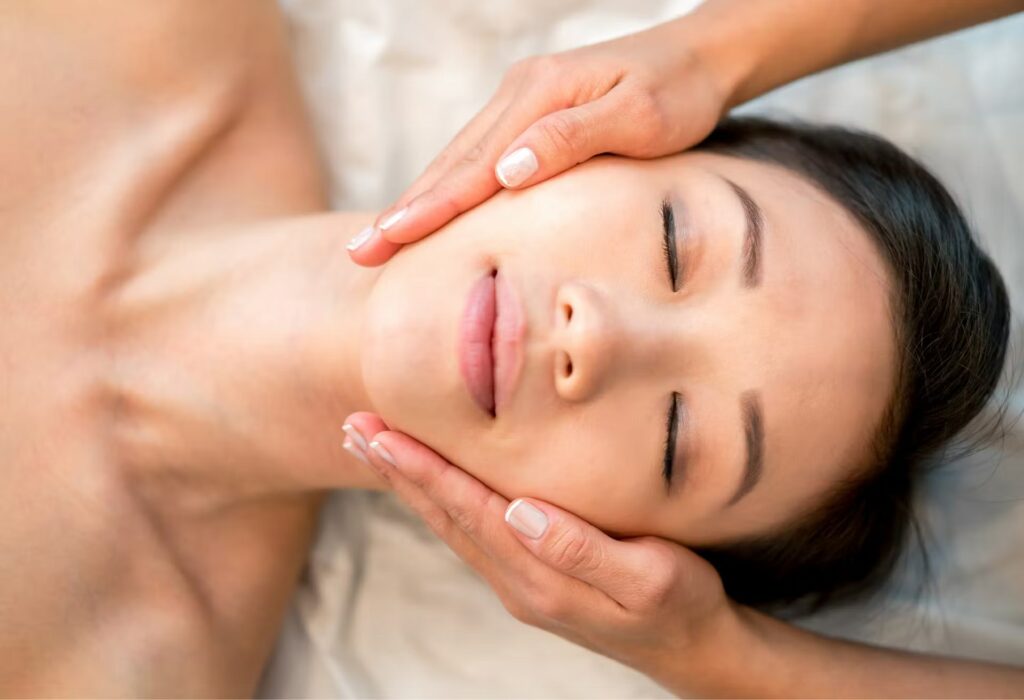In the beautiful complexity of our bodies, there are countless wonders that quietly contribute to our overall health and well-being. These incredible structures often work behind the scenes, subtly influencing our everyday experiences. One of these unsung heroes is the vagus nerve. Though it doesn’t garner the same attention as our heart or brain, its impact on our bodily functions is profound. Join us at Calm San Diego as we embark on a journey to unravel the mysteries of this remarkable nerve, exploring its functions, significance in neuroscience, and potential therapeutic applications.
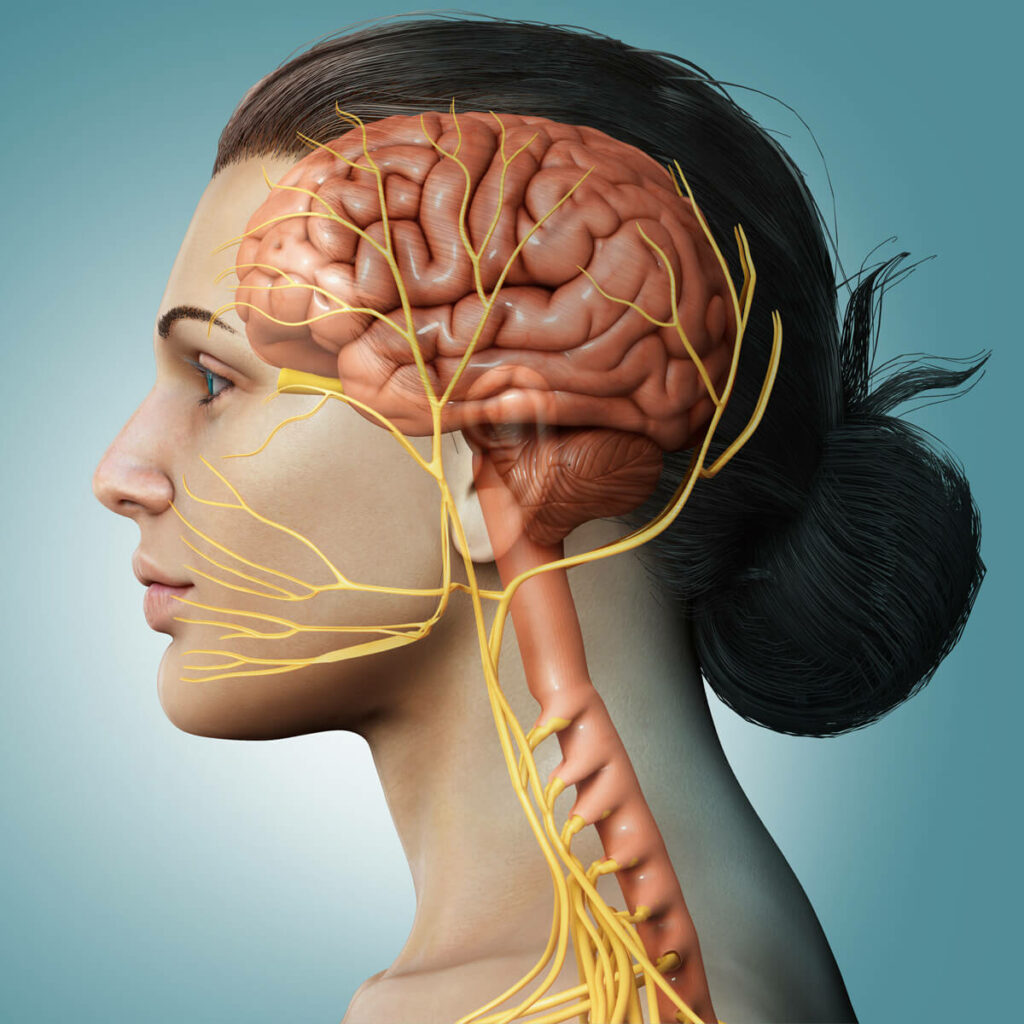
Meet the Vagus Nerve: Your Body’s Hidden Superhighway
The vagus nerve, also known as the tenth cranial nerve, is truly an anatomical marvel. Born in the brainstem, it winds its way down our neck, touching vital organs like the heart and lungs, before reaching its final destination – the gut. Its name, “vagus,” is derived from the Latin word for “wandering,” perfectly capturing its extensive journey throughout the body. It’s no surprise then that it holds the title for the longest cranial nerve.
Just as a river carves its path over centuries, evolution has shaped the vagus nerve with painstaking precision. As we humans adapted to various environmental and physiological challenges, the vagus nerve evolved alongside us. Today, it governs a range of essential functions, ensuring our body remains in a state of balance, or homeostasis.
The Vagus Nerve: A Shining Star in Modern Neuroscience
In the fascinating realm of neuroscience and neurology, the importance of the vagus nerve is increasingly acknowledged. It plays a crucial role in the parasympathetic nervous system – the calming counterpart to the stress-induced “fight or flight” mode triggered by the sympathetic nervous system. The parasympathetic system is all about “rest and digest,” helping the body maintain and recover.
Interestingly, the vagus nerve has a strong connection with neurotransmitters, especially serotonin, which plays a pivotal role in mood regulation, appetite, and sleep. Furthermore, the anti-inflammatory properties of the vagus nerve, made possible by the release of acetylcholine, have become a focal point in research. This unique attribute hints at its potential in warding off inflammatory disorders and promoting overall health.
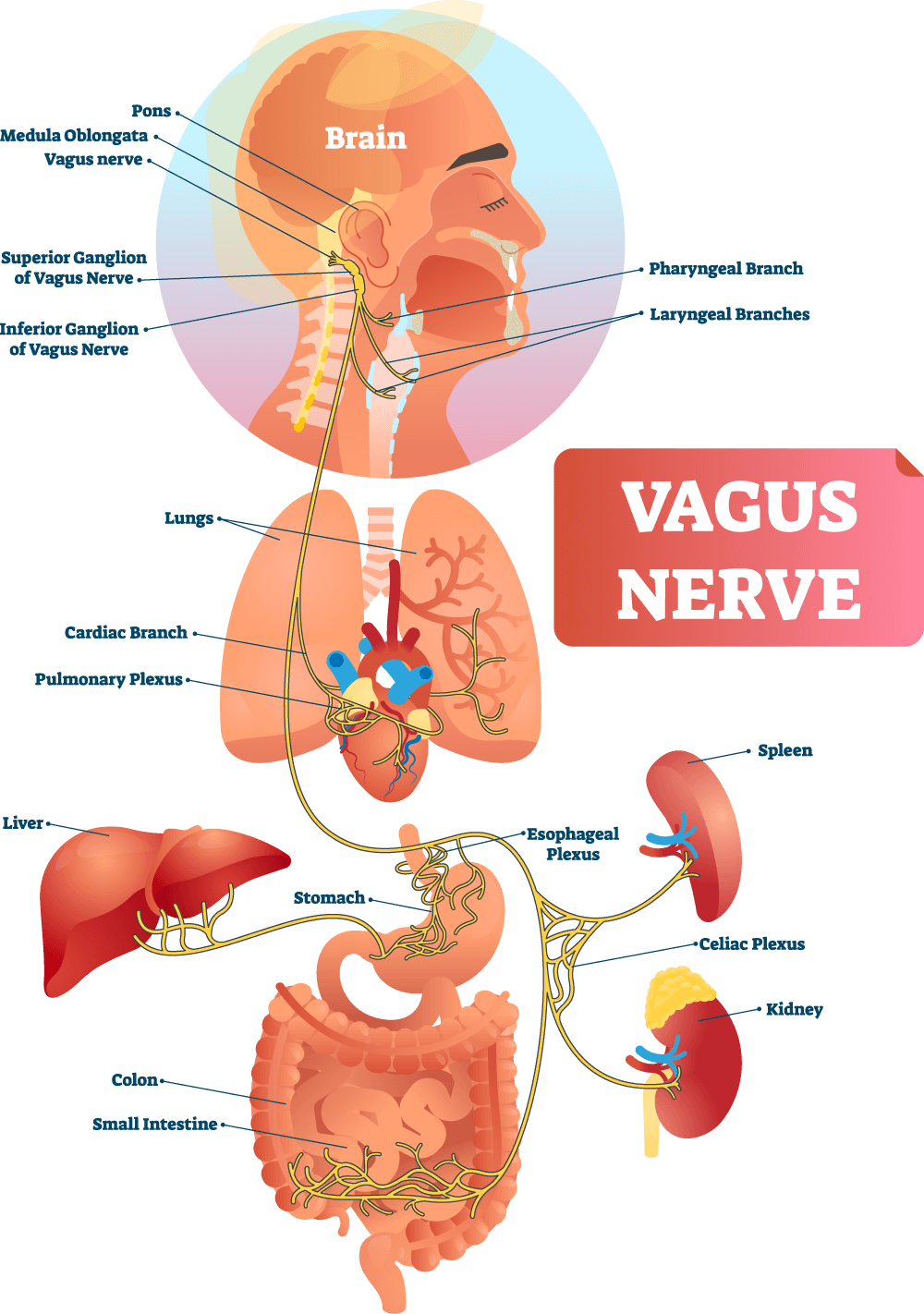
Digestion and the Vagus Nerve: A Harmonious Dance
The influence of the vagus nerve on digestion is profound, to say the least. It acts as a communication superhighway between the brain and the gut, ensuring optimal digestion by stimulating stomach acid production and regulating digestive enzymes. When the vagus nerve is not performing optimally, it can lead to conditions like GERD and gastroparesis.
Moreover, a growing field of research is dedicated to the gut-brain axis. This connection proposes that our gut health can significantly impact our mental well-being and vice versa. The vagus nerve serves as a vital link in this relationship, and its health can influence our gut bacteria, which in turn can affect various aspects of our digestive and mental health.
The Vagus Nerve: An Ally Against Anxiety
Given its influence on neurotransmitters such as serotonin, the vagus nerve has become a key player in discussions surrounding emotional and mental health. Enhancing vagal tone – the activity of the vagus nerve – has shown promise in reducing symptoms of anxiety, stress, and even depression.
In the world of holistic therapies, acupuncture stands out. This ancient practice, rooted in Traditional Chinese Medicine, has shown potential in modulating vagal activity. Stimulating specific points in the ear, known as auricular acupuncture points, can enhance the activity of the vagus nerve, leading to reduced anxiety and an overall sense of calm.
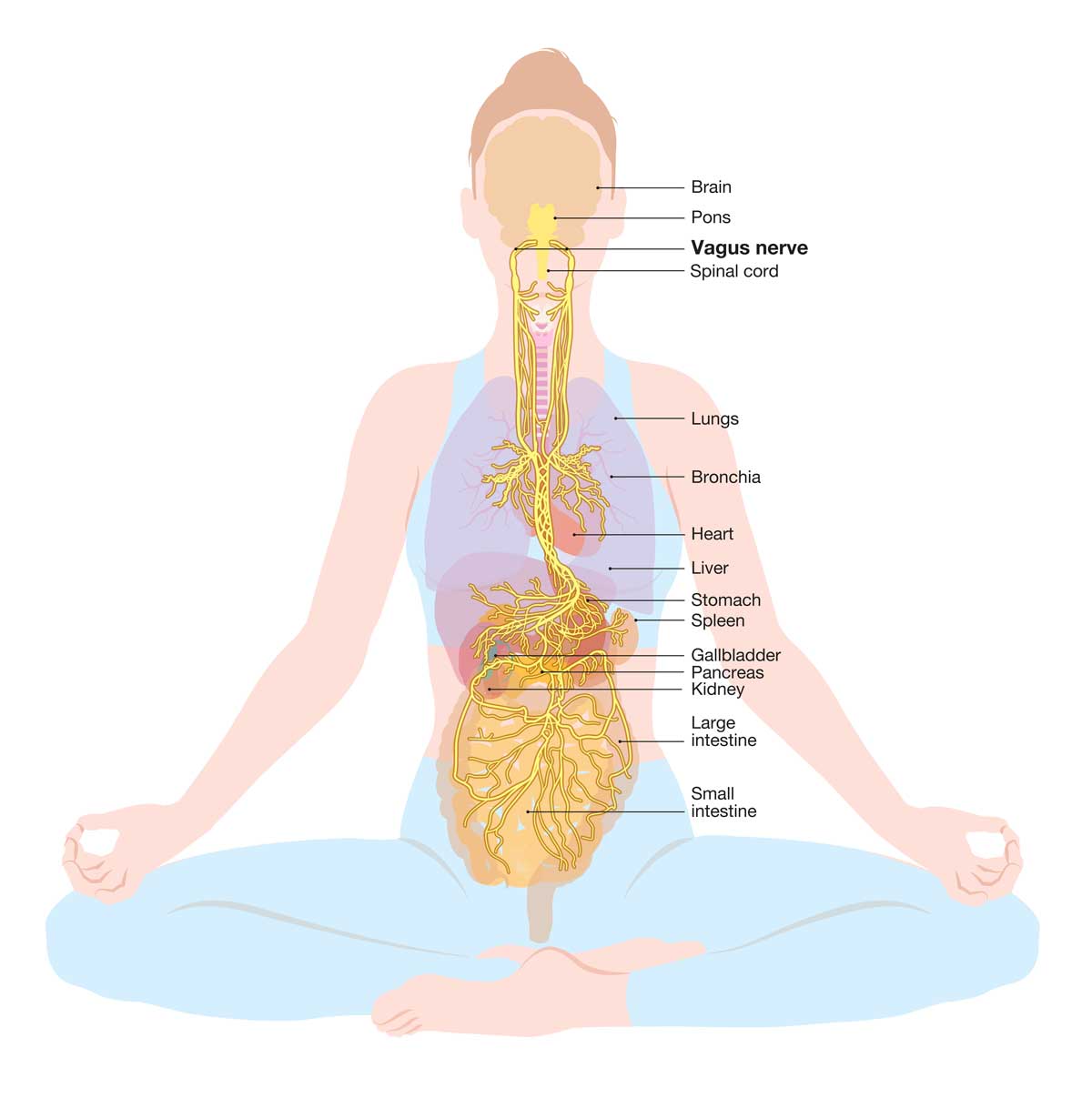
Empower Yourself: Practical Ways to Stimulate the Vagus Nerve
While medical and holistic treatments play a crucial role, there are simple, everyday techniques you can use to stimulate your vagus nerve:
Deep Breathing Techniques: Deliberate, deep breaths with extended exhalation activate the parasympathetic system.
Cold Showers: A short burst of cold can rejuvenate the mind and stimulate the vagus nerve.
Vocalization: Activities like singing or humming can naturally stimulate the vagus nerve, especially when deep-chested.
Gargling: A common activity that can indirectly stimulate our vagal pathways.
Mindful Practices: Incorporating yoga and meditation into your routine can be beneficial for enhancing vagal tone, leading to relaxation and improved mental clarity.
The Vagus Nerve and Acupuncture: A Pathway to Balance and Health
In the fascinating world of neuroscience, the vagus nerve is increasingly gaining attention for its profound role in regulating our bodily functions. Acting as a superhighway of communication between our brain and vital organs, the vagus nerve is fundamental for maintaining homeostasis – the body’s state of balance.
Acupuncture, an ancient practice rooted in Traditional Chinese Medicine, has shown potential in modulating vagal activity, resulting in a myriad of health benefits. By stimulating specific points on the body, acupuncture can promote a vagus nerve reset, leading to enhanced nervous system balance.
Acupuncture and the Vagus Nerve: A Powerful Connection
Acupuncture involves the insertion of thin needles into specific points on the body. This process can stimulate the vagus nerve, promoting its function and increasing its activity. Furthermore, acupuncture enhances the release of neurotransmitters and hormones, thereby further improving vagus nerve function.
One study found that acupuncture can stimulate the vagus nerve to promote anti-inflammatory effects on the body. The research concluded that acupuncture stimulation transmitted signals into the vagus nerve and mediated anti-inflammatory responses in the spleen. These findings highlight acupuncture’s potential in alleviating inflammatory conditions and promoting overall health.
Auricular acupuncture, a form of acupuncture that involves needling specific points on the ear, is believed to stimulate the vagus nerve. Research has indicated that auricular acupuncture can provide vagal regulation through the auricular branch of the vagus nerve, impacting both the autonomic and central nervous systems. It was also suggested that auricular acupuncture might hold potential to prevent neurodegenerative diseases by regulating the vagal system.
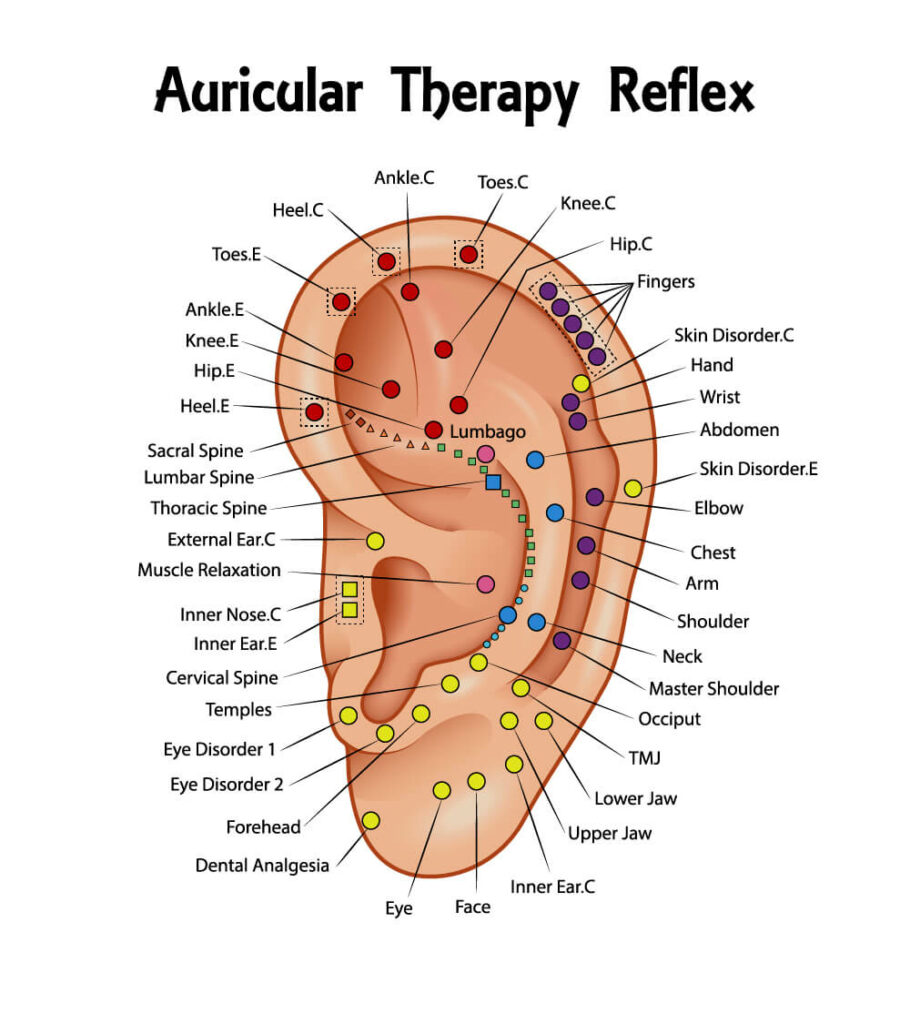
Acupuncture Points for Vagus Nerve Stimulation
Several acupuncture points are known to stimulate the vagus nerve:
Conception Vessel 12 (CV 12): Located on the midline of the abdomen, CV 12 stimulates the vagus nerve, promoting digestion and relaxation.
Conception Vessel 17 (CV 17): Situated in the center of the chest, CV 17 regulates the vagus nerve, enhancing respiratory function and reducing stress.
Heart 7 (HT 7): Found on the wrist, HT 7 is a powerful point for stimulating the vagus nerve, promoting relaxation and reducing anxiety.
Stomach 36 (ST 36): Located on the leg, ST 36 helps regulate the vagus nerve, promoting digestion and reducing stress.
Pericardium 6 (PC 6): Situated on the inner wrist, PC 6 activates the parasympathetic nervous system and increases vagal activity.
Lung 7 (LU7): Found on the wrist, LU7 calms the mind and stimulates the vagus nerve.
Governing Vessel 20 (GV 20): Located on the top of the head, GV 20 helps regulate the autonomic nervous system and promotes relaxation.
Stomach 9 (ST 9): Positioned on the neck, below the Adam’s apple and between the two carotid arteries, ST 9 calms the mind, alleviates pain, and benefits the throat.
Auricular Points: The ear harbors several points that can stimulate the vagus nerve, including the cymba conchae, the tragus, and the cavum conchae.
These acupuncture points help regulate the autonomic nervous system, reduce inflammation, improve digestion and immune function, promote relaxation, and alleviate anxiety and stress. However, it’s important to note that while these points are commonly used in acupuncture for vagus nerve stimulation, their effectiveness may vary depending on the individual and the specific condition being treated. Therefore, it’s always best to consult with a licensed acupuncturist for a personalized treatment plan.
Benefits of Acupuncture for Vagus Nerve Stimulation
The benefits of acupuncture in the context of vagus nerve stimulation are manifold. This ancient Chinese practice can be a safe and effective way to stimulate the vagus nerve and promote its function, offering a non-pharmacological intervention for various health conditions.
Research has shown that acupuncture can reduce inflammation, improve heart rate variability, and regulate autonomic function — all of which are related to vagus nerve function. The anti-inflammatory effects of acupuncture, in particular, have been attributed to its ability to modulate the vagus nerve, providing an alternative treatment option for conditions associated with chronic inflammation.
Moreover, acupuncture has been found beneficial as an adjunctive therapy for conditions related to vagus nerve dysfunction, such as anxiety, depression, and gastrointestinal disorders. By stimulating the vagus nerve, acupuncture can help restore balance in the body, leading to improved mental and physical health.

Vagus Nerve Exercises and Techniques
Alongside acupuncture, there are several non-invasive exercises and techniques that can help stimulate the vagus nerve. These practices can be easily incorporated into your daily routine and performed at the comfort of your home.
Deep breathing exercises: Slow, deep breathing can stimulate the vagus nerve, promoting relaxation and stress reduction. It also improves heart rate variability, a key indicator of vagal tone and overall health.
Meditation: Mindfulness meditation and other types of meditation can stimulate the vagus nerve, promoting mental clarity and emotional balance. Regular practice can improve stress resilience and enhance overall well-being.
Yoga: Certain yoga poses, such as downward-facing dog, child’s pose, and fish pose, can stimulate the vagus nerve, promoting relaxation and reducing stress.
Massage therapy: Gentle massage around the neck and throat can stimulate the vagus nerve, promoting relaxation and reducing stress. Use a Yoga TuneUp ball during deep abdominal breathing for even deeper stimulation.
Vagus Nerve Dysfunction: Causes and Symptoms
The vagus nerve can become dysfunctional due to various reasons, resulting in a range of symptoms. Chronic stress, inflammation, nerve damage, and certain health conditions like diabetes, autoimmune disorders, and cardiovascular disease can impact the function of the vagus nerve. Lifestyle factors such as poor diet, lack of exercise, and chronic sleep deprivation can also contribute to vagus nerve dysfunction.
Symptoms of vagus nerve dysfunction can include:
- Difficulty swallowing
- Changes in voice or hoarseness
- Heart palpitations or arrhythmia
- Gastrointestinal issues, such as bloating, constipation, or diarrhea
- Low blood pressure or fainting
- Chronic cough or throat clearing
- Impaired gag reflex
- Anxiety or depression
- Reduced sweating or dryness of the skin
- Loss of appetite or early satiety
- Decreased sense of taste
- Tinnitus or hearing loss
- Reduced heart rate variability
It’s important to note that these symptoms can also be caused by many other conditions, so it’s essential to consult a healthcare professional for a proper diagnosis.
Vagus Nerve Disorders
Vagus nerve disorders refer to a group of medical conditions that affect the function of the vagus nerve. These include gastroparesis, neurogenic bladder, arrhythmia, tinnitus, fibromyalgia, irritable bowel syndrome (IBS), migraines, and anxiety disorders. These conditions’ specific symptoms and severity can vary based on the extent and location of the vagus nerve damage.
Show your Vagus Nerve some love
The vagus nerve plays a key role in maintaining the body’s homeostasis, regulating processes from digestion to heart rate. Acupuncture, alongside other vagus nerve stimulation techniques, can offer numerous health benefits by enhancing the function of this vital nerve.
By incorporating these practices into our daily routines, we can support the body’s natural healing processes, achieve a greater sense of balance, and improve our overall well-being. Remember, the journey to health is a marathon, not a sprint. With patience, consistency, and the right strategies, you can harness the power of the vagus nerve to enhance your health and vitality.




